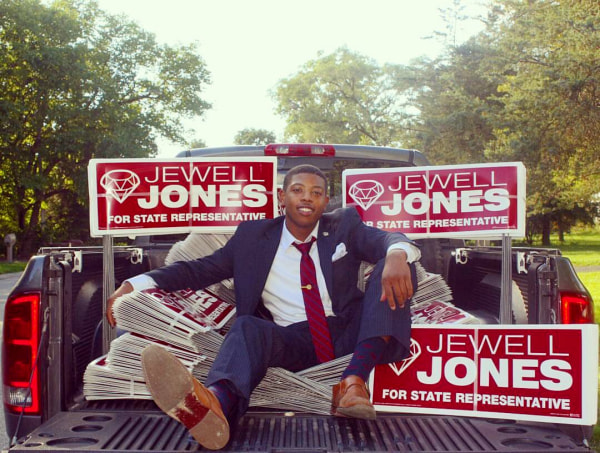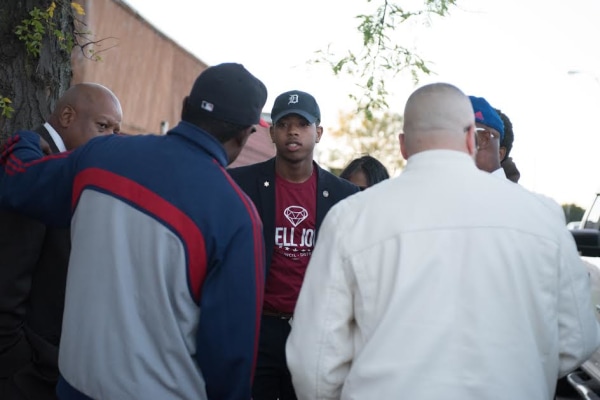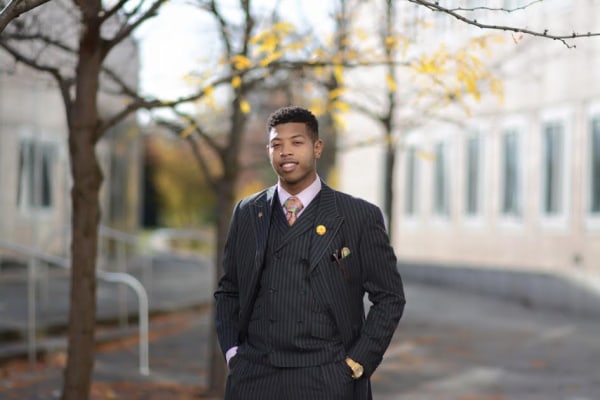
By Lucas Vazquez
When he’s not studying for exams at University of Michigan-Dearborn, 21-year-old Jewell Jones is representing more than 60,000 constituents in the 11th district of the Michigan House of Representatives.
Jones made history on November 8th, 2016, by becoming the youngest politician to ever be elected in the state of Michigan, in a landslide victory by winning 64 percent of the vote against Republican Robert Pope.
Before becoming a State Representative, Jones was also the youngest councilman on the Inkster City Council Board, in which he focused on issues of public safety, economic development and income inequality. He ran on a campaign of addressing these issues and improving the material living conditions of his constituents.

In hoping to bring more young people and new ideas into the Democratic Party, Jones is trying to bring a breath of fresh air to the Party that many say is in a critical period of self-reflection after suffering a historic national defeat in the 2016 election, including losing in states, like Michigan, that have historically been a blue wall for Democrats.
While in office, Jones wants to address some of the economic problems that he sees affecting his constituents every day. He intends to directly confront income inequality and poverty in Michigan, which in turn he believes will ultimately bolster the Democratic Party by reconnecting it with its base. What he is most passionate about, and arguably most importantly, is changing the party’s message and goals to one with a more progressive agenda and one that is more in sync with the base of the party.
He wants to expand the party’s reach by connecting and addressing the concerns of those who felt ignored by the party in the recent election through organizing communities and “meeting people where they are at.”
NBCBLK caught up with the young lawmaker to discuss his goals for the year, strategies for voter turnout, and Trump’s executive orders.
What are your goals for the upcoming legislative year?
I’m working on a piece of legislation geared mostly around cyber security and something that I’m really looking at is the sexual assault on college campuses legislation that I’m working on right now actually, and some criminal justice reform policies.
I’m looking at income inequality and trying to figure out how to get some resources back to the folks back home and through the lens of new jobs and financial literacy programs. I’m working on things like skilled trade training back in the area because for the most part, vocational training and workforce development needs some improvement.
Related: Politics, Philanthropy, and Love: A Conversation with Common
So, I’m trying to get those back and really trying to get people on their feet so they can start living a life that’s of quality because over the past few years, especially in revenue sharing cuts and other programs and the lack of jobs in general, a lot of people out here are struggling even if they’re going to work full-time and then if they have a family to care for. They’re living right around poverty or right under it, especially in my district.

Do you hope the Democratic Party follows the lead of you and your colleagues by trying to tackle some of the issues that you guys are working on?
The Democratic Party needs to work on issues to build up capacity and engagement in communities. I think certain communities have been taken for granted by the Democratic Party. So, I believe getting back into those communities, our base and getting back to the issues that affect them, which income inequality is a big issue; public education’s a big issue.
Getting back to those issues I think will help bolster the Democratic Party once again. Recently we had our state convention and while the rhetoric was nice, there was a lack of representation from all parties in certain aspects of the convention. So, I think the Democratic Party really needs to give back to their base and see how they can expand on those issues.
In what way was there a lack of representation at your state convention?
The conversation needs to change a little bit. Here in Michigan, a lot of people are seeing how our state went Trump but on the local and state elections, a lot of democrats got elected up and down the ticket. So, trying to figure out how we share our message with those in the community and kind of cease and steer away from using this broad message that they think covers everyone.
Especially after the contentious election, we’re in this predicament where we’re often on the defense now and I think instead of doing that, the party needs to focus on its own and just focus on our messaging because that’s something that we need to improve on. While the Democratic Party are fighters, we stayed away from that fight. We need to be more proactive even in terms of the messaging and showing people how diverse the party is and what we can really do. I think that would be beneficial for the party.
What’s the message you want to see the Democratic Party take on, on a national level?
I think people need to know we’re the people’s party. The message we need to let people know in the community is that no matter who you are, you have some kind of stake or some skin in the game in the Democratic Party.
You have your Southern Democrats in Michigan and then you have your moderate Democrats and I think even like our Southern Democrats that vote Republican in certain areas of the state, for whatever reason they’re voting Republican.
They shouldn’t be but if we did a better job of getting the message out about members of the party and why we’re members of the party, I think if the democrats did that for example, we’d be able to capture so many more participants on the democratic side.
What are the best strategies to increase turnout for the Democrats?
You just have to meet people where they’re at. A lot of times when people on campaigns, for example, have these events telling people to come out but at the end of the day a campaign is dollars and doors. We’re talking about raising a whole lot of money and you’re talking about putting yourself in front as many people as possible, typically on their doorstep.
And going out to see them which also gives you a perspective on the people that you’ll be representing. So, I think in terms of increase in turnout and building up the party we have to start meeting people where they’re at. And that ties into the messaging because we all have a story to share.
Familiarity is key. So, it’s all about being relatable. And then if you’re relatable and you have that message and then you actually are on someone’s doorstep and you’re trying to let them know, ‘this is me. I’m very similar to you. This is why I support the party. This is what we can do for you.’ I think that would be beneficial for the party.

What’s your reaction to the first weeks of Trump’s administration?
I’m not tripping that heavily. Black people have been struggling for a long time. But, a lot of Muslims and my friends in the area where I grew up, are calling me telling me these different stories and sharing Facebook posts talking about just the way they were treated even before he started dropping these executive orders.
I’ve heard stories of my friends getting expletives shouted at them at like a gas station and getting things thrown at them. I want to say it’s refreshing, not necessarily from a positive aspect but now you get to see people’s true colors out in the community because now people who have thought this way inside of their minds, they’re back to acting it out. So, you can kind of see these bad actors in the community now.
I’m happy to see a lot of communities and a lot of individuals coming together to address the issue and to stand as one voice. I think that’s going to be important moving forward that in the same vein that how the Democratic Party could improve, I think the greater community can improve and it’s through organizing and having a concerted effort of this is what we need done in our communities in order to continue improving the quality of life because it’s not like one group is going to make it on their own now because no one knows exactly what’s going to happen.
The President might just wake up one day and issue an executive order and we’re in a reactionary phase. I think especially with all the executive orders going on right now, we need to focus on organizing and just uniting and really just sticking together because it’s difficult for a lot of people out here.

How do you think Democrats in Congress should fight back against Trump’s agenda?
There’s a legislative way that you can go about doing things and resolutions for example but I think there’s also a time where you have to put your boots back on and get in the trenches with folk and do some agitation practices.
They need to be a voice even behind the scenes making sure that they’re galvanizing people, really making sure they’re getting the information down to the pipeline so people at home know exactly what’s going on and know exactly how we can participate and be conducive towards dismantling some of these negative practices that are going on.
But I think like on the state level, there’s certain things that we do with protests and stuff and some of us used to be organizers back in the day. So I think sometimes stepping outside of that role and getting your boots on the ground with your neighbors back in the community, that can be something that they can do to just show that they still stand with us because I think it’s important, you know, while they very well may be fighting in D.C. it’s important to come back home and letting people know that you’re standing with them because a lot of times people just need that encouragement.
They need to see a familiar face. I think they need to make sure they’re standing in the communities and making sure that they’re fighting just for the people in whatever way they can.
What’s in store for the future you going forward? Congress?
We’re just enjoying the most. Wherever God leaves us. You pass me an alley-oop, I catch and I dunk. I’m just enjoying the position right now and learning and growing but if God has plans to position us elsewhere I’m moving.


